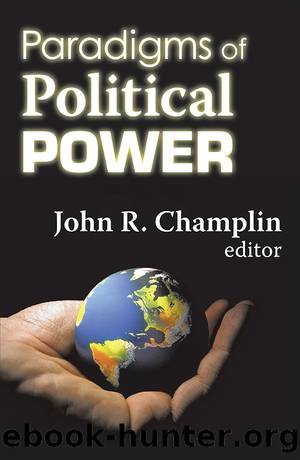Paradigms of Political Power by John R Champlin

Author:John R Champlin [Champlin, John R]
Language: eng
Format: epub
Tags: Philosophy, Political Science, Political, General
ISBN: 9781351500920
Google: vpvxweiDxHQC
Goodreads: 35635122
Publisher: Routledge
Published: 2017-07-05T00:00:00+00:00
NOTES
1. Power, pp. 10 ff. (London, 1938).
2. Professor Popper has made us aware of the importance of this side of the social sciences.
3. English translation, Power (Hutchinsonâs, 1948).
4. Power and Personality (New York, 1948). See also Politics, Who Gets What, When, How? reprinted in The Political Writings of H. D. Lasswell (Glencoe, Ill., 1951).
5. Power and Society, H. D. Lasswell and A. Kaplan, Yale Law School Studies, Vol. II, 1950.
6. Allen and Unwin: London, 1930.
7. Dynamic Administration (London Management Publications Trust Ltd., 1934). The book is much better than the title suggests.
8. E. Meyer, Geschichte des Altertums, V, p. 4, quoted by Popper, The Open Society and Its Enemies, Vol. I, note to p. 106.
9. Cf. Mencius on the Mind, pp. 90 ff. (London, 1932).
10. The relation of the general heading of each type to its subheadings is not the same in all cases. I hope this may be indicated by the way I have worded each type.
11. Talleyrand, Mémoires, Vol. II, pp. 155â162. English translation, Vol. II, pp. 119 ff. Cf. Ferrero, The Principles of Power, p. 19 (English translation, New York, 1942).
12. Op cit., p. 290.
13. Op. cit., p. 144.
14. The terms âthe Credenda and Miranda of Powerâ are taken from the all-too-short chapter in C. E. Merriamâs book Political Power (New York, 1934) where Professor Merriam discusses different ways in which symbols help to maintain faith in and respect for a political system.
15. Grundriss der Sozialökonomik, Abteilung III; Wirtschaft und Gesellschaft, pp. 753 ff. (Tübingen, 1925).
16. Cf. Hohfeld, Fundamental Juridical Conceptions (Yale, 1919).
17. J. P. Plamenatz in his contribution to the Symposium âRightsâ in the Aristotelian Society Supplementary Vol. XXV (pp. 75 ff.) seems to me not to make this distinction clear. In withdrawing an earlier attempt (in Consent, Freedom and Political Obligation) to define a right as âa power which a creature ought to possess,â he says âWhen thereâs nothing to prevent a man doing what he wants, he is said to have the power to do it; but he can be prevented from doing what he has a right to do. In that case he hasnât the power where he has the right, and his right is therefore not a power. It is possible to talk of a power that a man ought to possess, but that, too, is a clumsy and misleading expression. There are things that men want to do but canât do even when they are not prevented by other people.â This is to confuse power of my Type I (a) (physical capacity as causally efficacious) with power of my Type V (legal capacity). A man can, for instance, tell a trespasser to leave his property, but he may not assault him in order to remove him.
18. An analogous problem in connection with the interpretation of some concepts in law is considered by Professor Max Gluckman in the chapter called âThe Paradox of the âUncertaintyâ of Legal Concepts and the âCertaintyâ of Law,â in The Judicial Process among the Lozi of Northern Rhodesia (Manchester University Press: forthcoming).
Download
This site does not store any files on its server. We only index and link to content provided by other sites. Please contact the content providers to delete copyright contents if any and email us, we'll remove relevant links or contents immediately.
The remains of the day by Kazuo Ishiguro(8961)
Tools of Titans by Timothy Ferriss(8357)
Giovanni's Room by James Baldwin(7313)
The Black Swan by Nassim Nicholas Taleb(7095)
Inner Engineering: A Yogi's Guide to Joy by Sadhguru(6780)
The Way of Zen by Alan W. Watts(6587)
Asking the Right Questions: A Guide to Critical Thinking by M. Neil Browne & Stuart M. Keeley(5747)
The Power of Now: A Guide to Spiritual Enlightenment by Eckhart Tolle(5738)
The Six Wives Of Henry VIII (WOMEN IN HISTORY) by Fraser Antonia(5492)
Astrophysics for People in a Hurry by Neil DeGrasse Tyson(5172)
Housekeeping by Marilynne Robinson(4429)
12 Rules for Life by Jordan B. Peterson(4297)
Double Down (Diary of a Wimpy Kid Book 11) by Jeff Kinney(4257)
The Ethical Slut by Janet W. Hardy(4235)
Skin in the Game by Nassim Nicholas Taleb(4229)
Ikigai by Héctor García & Francesc Miralles(4228)
The Art of Happiness by The Dalai Lama(4118)
Skin in the Game: Hidden Asymmetries in Daily Life by Nassim Nicholas Taleb(3983)
Walking by Henry David Thoreau(3946)
